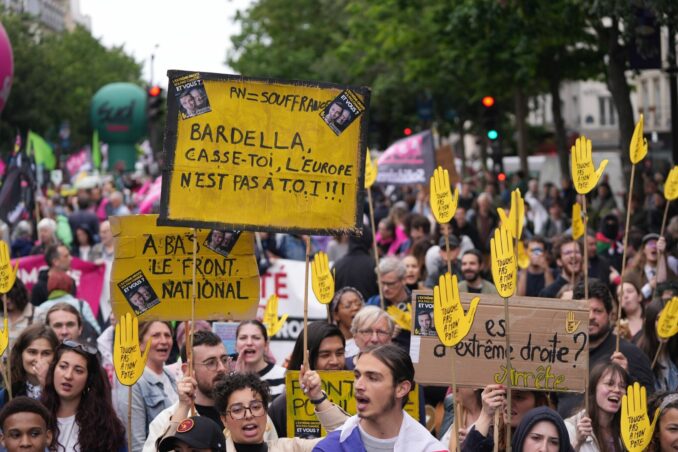Far right makes gains in E.U. vote – what next?

French protest ultra-right National Rally, Paris, June 15, 2024. Left parties have agreed on ‘popular front’ to contest both the right and the far right in the snap July elections.
The June 9 vote for members of the European Union Parliament demonstrated a consistent shift to the right in public opinion. Far-right parties made the biggest gains, in some cases — France, for example — coming in first.
The vote showed widespread disenchantment with the establishment pro-capitalist parties of the center right and the nominally social democratic parties of the center left. All these establishment parties in the major EU countries have promoted more spending for armaments and strengthening NATO, and have lined up behind U.S. imperialism against Russia. These parties have also supported Israel’s genocide against Gaza, while cutting funds for social programs, and they joined the ultraright’s attempt to scapegoat migrants for the ills of capitalist society.
This vote, in which only about half the eligible voters participated, is an early warning of a threat from the far right, rather than a signal of immediate change in EU policies or in that of the individual countries. That’s because the executive and main legislative body in the EU is the European Commission and not the EU Parliament, which can only either support or veto the EC’s proposals. The European Commission remains in the service of the big West European and U.S. banks.
It’s expected that Ursula von der Leyen, the current president of the EC, will remain in office. Though not considered of the far right, Von der Leyen has been actively promoting NATO’s war charge against Russia.
The far-right parties base their support on a racist and xenophobic appeal, which is strongly anti-migrant. Some analysts have expressed worries about the danger of fascism from the far-right parties. They observe that the changes shaking society — U.S. loss of its former overwhelming power, danger of economic crisis, threat of major wars against Russia, in West Asia, and in the South China Sea — may encourage the imperialist ruling class into promoting a fascist-style party to save its domination.
In France, President Emmanuel Macron reacted to his party’s defeat in the EU vote by calling new parliamentary elections June 30 and July 7. There is a strong possibility that a representative of the far-right National Rally (formerly National Front), which came in first in the EU elections with more than 31% of the vote, will wind up being the new premier. (Macron’s party got less than 15%.)
Stop war, build solidarity
A working-class party with revolutionary goals would not only defend workers in their countries against the imperialist ruling class, it would clearly oppose NATO’s war against Russia, would be in solidarity with Palestine and would do everything it could to build working-class solidarity with the migrants.
The drop in support for the establishment capitalist parties and the social democrats brought no significant gains by left parties. There were a few exceptions: To the nearest percent, the Workers Party of Belgium (PTB/PvdA) increased its support from 8% to 11%, the Communist Party of Austria (KPÖ) grew from 1% to 3% and the Communist Party of Greece (KPE) grew from 5% to 9%.
Meanwhile, the ultraright parties made large advances. Alternative for Germany (AfD) came in second in Germany with 16%. The extreme right-wing Freedom Party in Austria (FPÖ) and Vlaams Belang of Belgium both came in first in their countries, with 26% and 14% of the vote respectively. And in Italy, Prime Minister Giorgia Meloni’s government bloc, considered the most reactionary since Benito Mussolini, got nearly half the votes.
The U.S. corporate media sometimes presents the Western European far-right parties as anti-NATO or pro-Russia, or as defenders of national sovereignty against the European Union. This is false. Where these parties have grown closer to winning office through votes, they have accepted pro-EU and pro-NATO positions, acceptable to EU and U.S. bankers, while blaming migrants for everything.
Italy’s Premier Giorgia Meloni and Marine Le Pen, head of the National Rally in France, have supported the EU and increased funds for weapons and been sharply anti-Russia. The AfD has backed all the moves by the German government to arm Ukraine and to allow Kiev to use the weapons against targets inside Russia.
With few exceptions, the far-right parties are on the same page with nearly all the center-right and nominally social democratic parties regarding preparations for war, support for West European imperialism in alliance with the U.S. and support for Israel.
The next battle with the far right is shaping up in France with the impending parliamentary elections. Macron, who won two elections for president by presenting himself as the only alternative to Le Pen, now appears to be ready to share authority with the National Rally.
Other left parties in France — La France Insoumise (led by Jean-Luc Mélanchon), the Communist Party, Greens and the humbled Socialists, have made an electoral alliance to provide an alternative to both the National Rally and Macron’s party. Hundreds of thousands of people demonstrated in the streets of French cities on June 15 to oppose the far right and Macron’s pro-war center right.

